Top10VPN is editorially independent. We may earn commissions if you buy a VPN via our links.
The 10 Disadvantages Of Using a VPN
In This Guide
Understanding the disadvantages of using a VPN and appreciating what it can and can’t do is a crucial part of keeping yourself safe online. In this guide, we introduce the 10 most important VPN disadvantages.
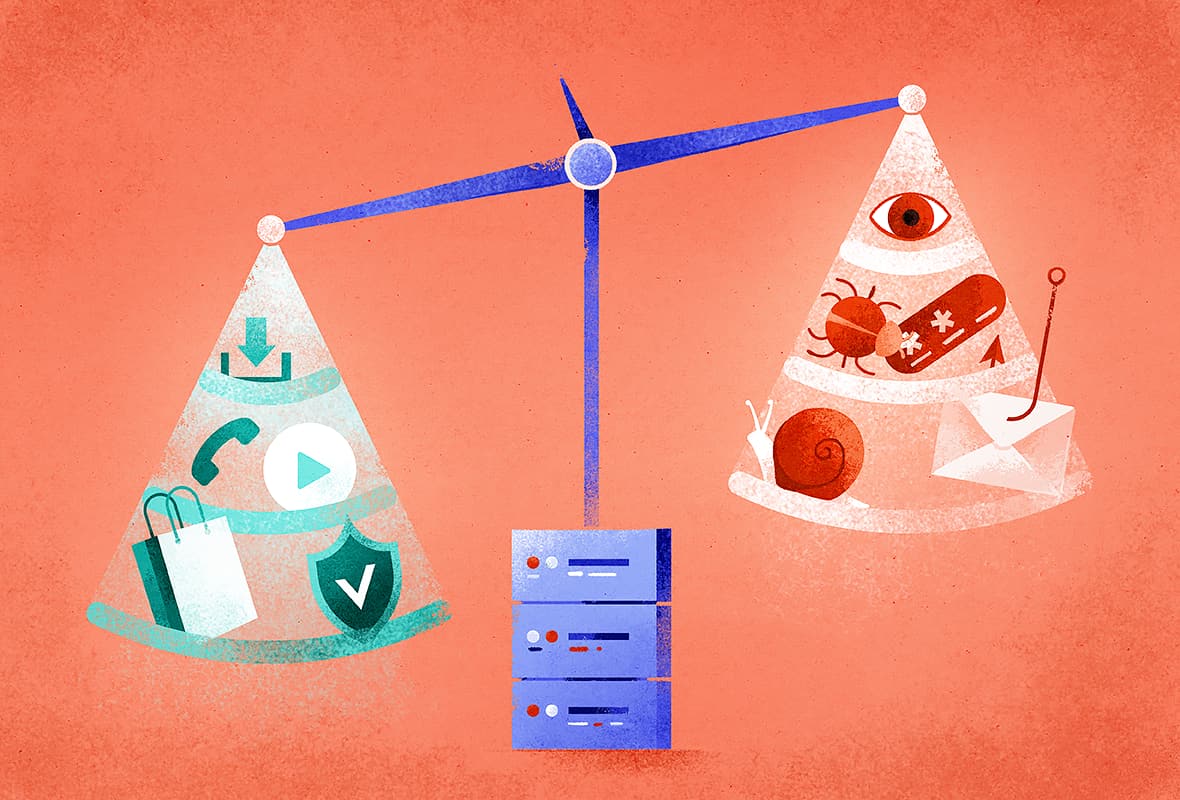
Using a good VPN enhances your internet privacy, security and access around the world. it hides your IP address, encrypts your web browsing activity, and lets you access websites blocked in your region.
But a VPN won’t solve all your problems. You must understand its limitations and drawbacks in order to decide if using a VPN is worth it for you.
Summary: The 10 main disadvantages of VPNs
- A VPN won’t give you complete anonymity
- Your privacy isn’t always guaranteed
- Using a VPN is illegal in some countries
- A safe, top-quality VPN will cost you money
- VPNs almost always slow your connection speed
- Using a VPN on mobile increases data usage
- Some online services try to ban VPN users
- It won’t protect you from malware or phishing attacks
- Most VPNs fail to bypass censorship and streaming blocks
- Many VPNs are outright dangerous to use
Despite the clear benefits, a VPN isn’t a universal solution for all internet privacy issues. Thinking that it is could put you at risk.
In this guide, we explore the ten main downsides to using a VPN.
Why Trust Us?
We’re fully independent and have been reviewing VPNs since 2016. Our advice is based on our own testing results and is unaffected by financial incentives. Learn who we are and how we test VPNs.
1. A VPN Will Not Make You Completely Anonymous
Even the best VPNs can’t guarantee your anonymity online. Your browsing behavior can still reveal your true identity in ways that your VPN service cannot control.
If you’re logged into a Google or Facebook account, a VPN won’t be able to stop those companies from monitoring your activity. It won’t help you to remove personal information from those websites, other social media accounts, or search engines, either.
There’s also a collection of techniques that advertisers use to track you across the internet. These include:
- Web trackers and cookies: Websites use trackers and cookies to tailor their service to your specific needs. They store details about you, such as your name and geographic location, and can be used to identify you despite a VPN connection.
- Browser fingerprinting: Most browsers reveal small pieces of information unique to you and your session. Authorities and advertisers can collate this information to build a ‘fingerprint’ that identifies your online presence, even when you’re using a VPN.
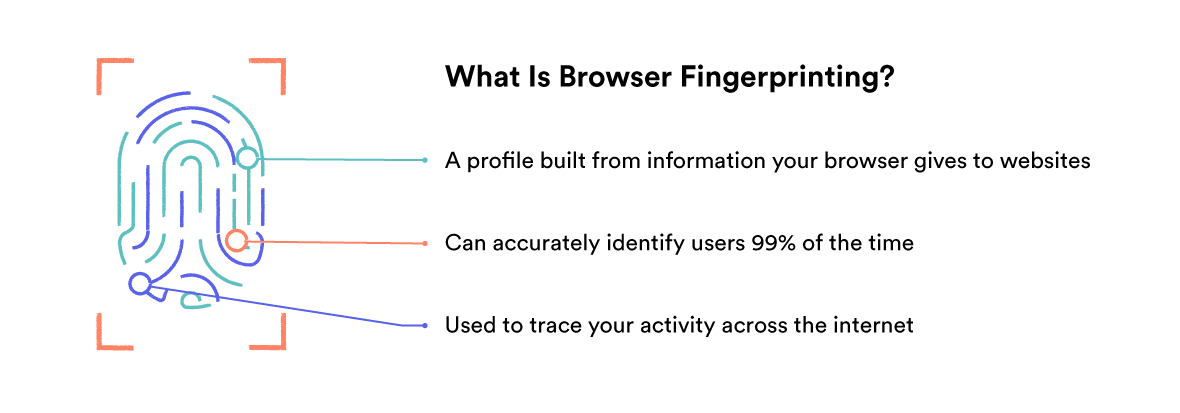
Websites can track you through browser fingerprinting.
To maximize your anonymity, you should pair your VPN with a genuinely private browser like Mozilla Firefox.
Consider also using an anonymous search engine like DuckDuckGo, and think carefully about your behavioral patterns online.
2. Your Privacy Depends On Your VPN Service
One of the key reasons to use a VPN is to stop unwanted individuals from observing what you do online.
Just as you wouldn’t let a stranger watch you from the window of your house, you don’t want strangers spying on you online.
However, by protecting yourself with a VPN, you’re still handing your browsing activity over to someone else: your VPN service.
All your traffic is routed through the VPN provider’s servers. If it wanted to, it could see who you are and what you’re doing online. That’s why it’s crucial to look at the VPN’s logging policy before you start using it.
Your privacy is entirely dependent on how trustworthy the VPN service is. If you choose an invasive VPN like SkyVPN, for example, your privacy won’t be protected at all.
You need a VPN that will not log any personally identifiable information about you or your activities. Ideally, its logging policy will have been independently verified by a third-party audit.
Without a no-logs policy, a VPN is a threat to your privacy and is probably unsafe to use. Learn more about logging policies, and see a list of genuine zero-logs VPNs, in our guides to VPN logs.
3. It’s Illegal to Use a VPN in Some Countries
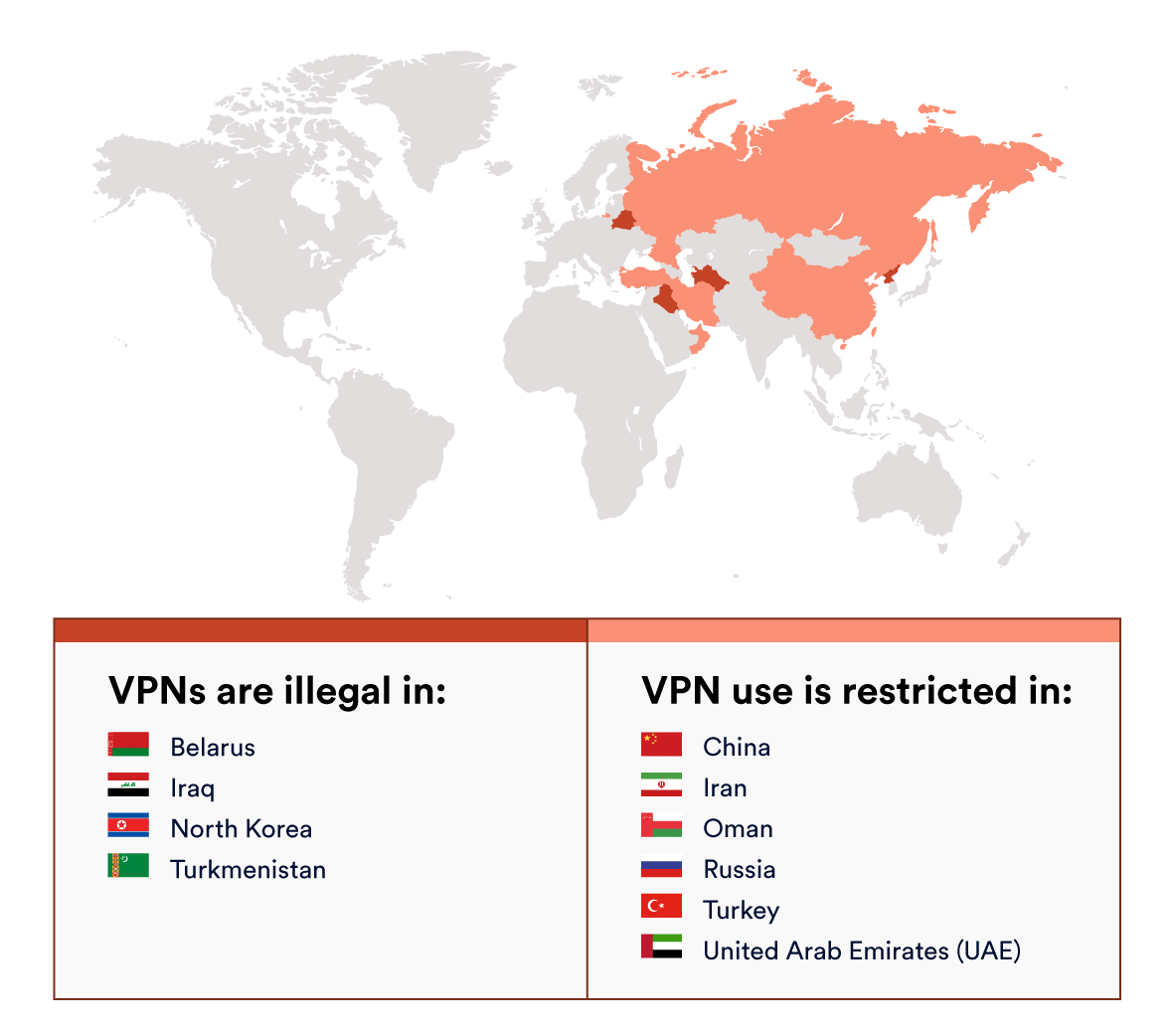
Countries where VPNs are illegal or restricted.
VPN apps are legal in most countries around the world, but there are still a small number of places where using a VPN is either illegal or restricted.
The countries that ban or regulate VPN use are:
- Belarus
- China
- Iran
- Iraq
- North Korea
- Oman
- Russia
- Turkey
- Turkmenistan
- United Arab Emirates
You could therefore be breaking the law by simply using a VPN, and you may be prosecuted if caught.
In China, for instance, anyone found using a VPN service, that has not been explicitly approved by the government, can be fined up to 15,000 yuan (equal to around $2,300).
To learn more about global censorship, see where in the world VPNs are legal or illegal.
NOTE: Using a VPN to perform illegal activities is still illegal, regardless of where you are in the world.
4. Good VPN Services Cost Money
The unfortunate truth is that a high-performing, safe VPN will cost money.
It doesn’t have to break the bank, though. The average price of our most-recommended VPNs is just under $4.00 a month, with the cheapest option priced at $1.11/month.
For a full price comparison, take a look at our analysis of how much VPNs cost.
While the best VPNs don’t necessarily cost the most money, you’re unlikely to find a service that’ll do everything you want for free.
The overwhelming majority of free VPNs are either poor quality or genuinely dangerous to use. When it comes to your privacy and security, it’s just not worth taking the risk.
That said, we have found a handful of trustworthy free VPN apps. These services are very good, considering you’re not paying a cent. However, their performance is limited. For example, most of them cap how much data you can use each month.
5. Using a VPN Slows Down Your Connection Speeds
Using a VPN service almost always slows down your connection speed. This is because, once you turn the VPN on, your connection starts to take a longer route to the internet, via your chosen VPN server.
With good-quality VPNs, the speed loss is minimal, to the extent that you won’t even notice it. For instance, Hotspot Shield delivers a speed loss of just 0.41%.
However, poor-quality VPNs can slow download speeds and increase latency to an unusable degree. This can be a major issue if your internet connection is already quite slow or if you’re doing something speed-sensitive, such as streaming, gaming, or torrenting.
EXPERT TIP: Very occasionally, a VPN will actually improve the speeds of certain activities by helping you to overcome ISP bandwidth throttling.
6. VPNs Increase Data Consumption
By encrypting your data and hiding your traffic from unwanted surveillance, a VPN also increases the amount of bandwidth you use.
For mobile VPN users, this means that whenever you use your VPN while connected to cellular data and not WiFi, you’re consuming data at a faster rate than you would without the VPN turned on.
Our research has shown that VPNs increase data usage by anywhere between 4% and 20%, depending on which VPN protocol you’re using.
As a consequence, you’ll probably reach your contract’s monthly data limit much faster. If you’re abroad, you could end up paying more in data roaming charges than you would otherwise.
For more information, read our complete guide to VPN data usage.
7. Some Online Services Ban VPN Users
Many online services discourage the use of VPNs or even prohibit them outright.
This is often the case with streaming services like Netflix and BBC iPlayer, which try to block VPNs in order to stop you from accessing videos and movies that aren’t licensed in your geographic region.
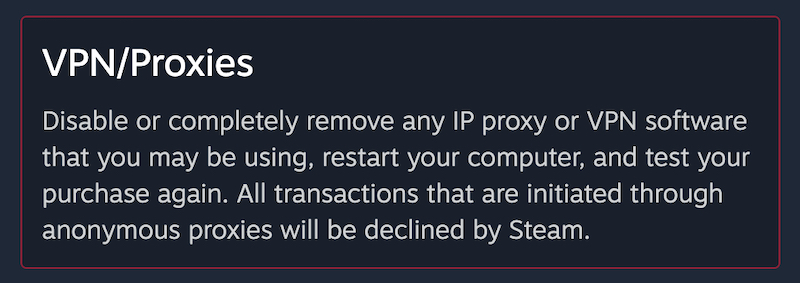
Steam actually recommends you turn off any VPN or proxy before attempting to make a purchase.
Some online stores, such as Steam, also try to prevent users from accessing its service with a VPN. This is because it has localized versions of the store with region-specific prices and release dates.
Although it’s not illegal to use a VPN to unlock ‘hidden’ content on these sites (in most countries), it may be against the company’s terms of use. If so, they have the right to suspend or delete your account if you’re found to be using a VPN.
NOTE: We have reviewed 61 VPN services and tested every one with Netflix. This includes poor-quality VPN services that are easily identified by Netflix’s censors. Despite this, we have never received an account suspension.
8. VPNs Don’t Protect You from Malware or Phishing Attacks
Misunderstanding the limits of a VPN can lead to the false impression that you are untouchable online.
While good VPNs provide essential protection from eavesdropping and man-in-the-middle attacks, VPNs do not protect you from every cyber attack, meaning they are not they’re not a catch-all solution.
Using a VPN will not protect you against:
- Malware: A VPN will not secure your device against most forms of malware (such as viruses, spyware, and ransomware). It will prevent the injection of malicious code during a man-in-the-middle attack, though.
- Phishing Attacks: You’re still susceptible to social engineering attacks, like phishing scams, when you have a VPN on. Be careful about which links you click on and what you download to your device.
NOTE: Some VPN services do offer additional security features. NordVPN’s Threat Protection feature, for example, includes an adblocker, anti-malware software, and a tool to prevent DDoS attacks. You’ll usually have to pay extra for these features, and they may not perform as well as equivalent standalone products.
9. It Isn’t Always Possible to Bypass Restrictions
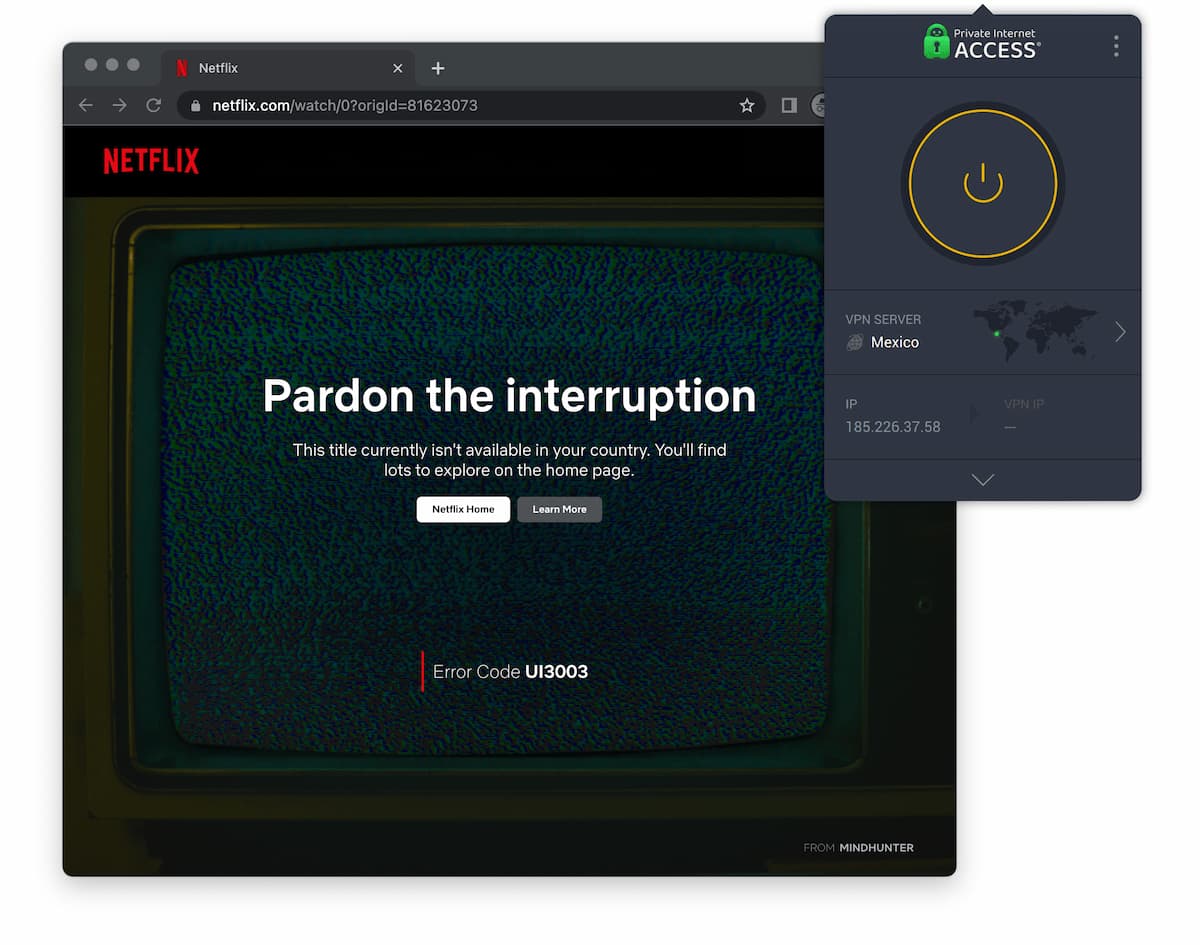
Netflix Mexico detected and blocked PIA when we attempted to stream exclusive content.
More than a fifth of VPN users in the US and UK use their VPN to “access geographically restricted entertainment content,” according to our global statistics survey. This involves unblocking foreign streaming libraries and watching content that isn’t typically available in your location.
Other people use VPNs to access the free, global internet from inside high-censorship countries such as China, Turkey, and Iran.
Unfortunately, no VPN provider can guarantee you’ll be able to bypass these restrictions at all times.
Some VPNs are better than others, but even the best services get blocked from time to time. It’s essentially a game of cat-and-mouse between the streaming service (e.g. Netflix) or censorship system (e.g. Great Firewall of China) and your VPN service.
Consult our lists of the best streaming VPNs and best anti-censorship VPNs for an overview of which VPNs currently bypass aggressive web restrictions.
You can also use our Great Firewall of China test to find out exactly which websites are blocked in China.
10. Most VPNs Are Dangerous to Use
Your VPN service has access to a lot of personal information. It can see your IP address, the websites you visit, and what you do on those websites.
Trustworthy VPN companies ignore this information, and most make sure it is never recorded in the first place.
However, while safe VPN companies make their money through your subscription payments, a large number of free VPNs are not safe. The companies behind these apps make money by collecting your personal information and selling it to the highest bidder.
In short: you are the product, not the VPN. For many of these companies, the whole purpose of operating a VPN service is to gather data to sell on for profit. This is the reason they’re often able to offer their VPN for ‘free’.
For this reason, using a VPN can often be more dangerous than not using a VPN. That’s why it’s crucial to do your research before downloading. Use a trusted, safe VPN, or don’t use one at all.


